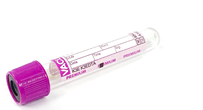Urine Cyanide Screening Test
Spot urine:
Number of plain bottle: 1
Volume: 10 mL
The 'Cyanide Specimen Collection Kit' contains:
2 x Plain Urine Bottles


(A) (B)
(A) Urine Cyanide Screening Test
(B) Urine Drug Screen
Tests requested via Generic Clinical Request System (GCRS)
Minimum urine volume for each urine bottle: 10 mL
2 x Yellow Screw Cap SPECIAL Fluoride-Oxalate Tubes
![]()
![]()
[**These pre-treated fluoride tubes are dedicated for cyanide analysis. Please do NOT use it for glucose test.**]
Minimum blood volume for each tube: 1.8 mL
(Fill up to the blue line mark as shown.)
1 x EDTA Tube

Minimum blood volume of EDTA tube: 3 mL
1 x TRL Request Form
Precaution
1. Collect 'Cyanide Specimen Collection Kit' from Rapid Response Laboratory.
2. Please follow Instructions for Cyanide Specimen Collection Kit.
3. Mix blood specimens by gently inverting them for 10 to 15 times. Send ALL blood specimens in ICE-water bath to laboratory immediately. (**Samples with minor clot can affect cyanide result.**)
4. Send non-biological specimen (such as liquid/product, container, packaging and/or insert) if any. (**Take extra safety precautions due to the potentially highly toxic nature and ensure no leakage.** )
Normal : negative
Screen for cyanide poisoning.
If screening result is POSITIVE while there is a strong clinical history in a symptomatic patient after possible cyanide exposure, cyanide intoxication is very likely.
If screening result is NEGATIVE or INTERFERENCE while there is a strong clinical history in a symptomatic patient after possible cyanide exposure, cyanide intoxication cannot be excluded. Please correlate patient's clinical conditions with other relevant laboratory investigations, e.g. arteriovenous oxygen gradient, anion gaps and lactate levels, and treat appropriately.
This test detects dissociable cyanides and is not sensitive to complex-bound cyanides.
Thiocyanate, the major metabolite of cyanide in urine is also detected by this method but the colour intensity may not be the same as cyanide ions.
Bromide or iodide at 5-10 mg/L (ppm) will cause negative interference.
Nitrite, permanganate, chromate and strong reducing agent can affect the result.
Positive or uncertain urine cyanide screening results should be confirmed by quantitative cyanide and metabolites analysis.